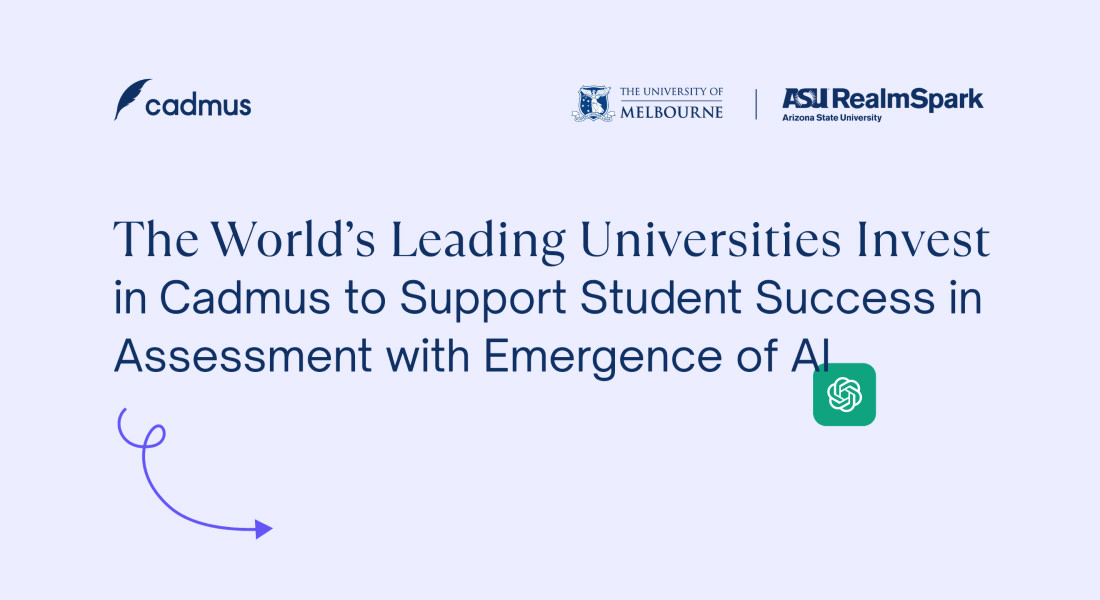Lessons on privacy, proctoring, and online exams

The conversation around student privacy and the use of online proctoring tools continues to be at the forefront of edtech debate. Over the last year, we’ve seen the discussion evolve from data breaches and privacy concerns to proctoring being labelled as just an “emergency fix”. In spite of this, many universities are compelled to implement such solutions to manage online exams and tests — not because they believe proctoring is the best solution, but often because it can seem like there are no other options.
As an educational technology company, we’ve seen firsthand the challenges universities face when trying to balance student, staff, and faculty needs in online assessment. In working with our partners, however, we’ve been able to refine our product to relieve privacy concerns while providing an effective alternative to online invigilation. Here are some lessons we’ve learned along the way:
Increasing assessment security alone isn’t the answer
Recreating a real-world exam setting online, be that through proctoring, device lockdown or other technologies, may seem like an obvious solution. However, there is limited evidence to suggest that these technologies effectively stop or deter cheating.
As Phillip Dawson writes in his book Defending Assessment Security in a Digital World, “assessment security vendors [like proctoring and testing tools], make claims about the effectiveness of their products, but many are wary of outside researchers’ attempts to verify these claims; they are essentially asking us to trust them”.
By focussing on assessment security alone, we take an adversarial stand against students, trying to prevent or ‘catch’ cheating without understanding its root causes. Instead, in line with current research and TEQSA recommendations, we’ve seen the benefits of taking a more learner-centred and balanced approach to academic integrity.
Our platform is designed to balance education, prevention and detection of academic misconduct by combining impactful assessment design, developing students’ capabilities and skills, providing support to students, and using non-invasive detection technologies (e.g. learning analytics and text matching).
Ultimately, if students feel at ease while completing assessments, they are less likely to cheat — and online monitoring isn’t doing anything to ease the tension.
Be transparent about data with students
With a range of stories highlighting student privacy concerns with proctoring and invigilation software, it is easy for students to assume the worst of any new technology solution. In our experience, communicating clearly and early with students around how data is collected and used can help manage expectations and prevent potential backlash.
It is up to software providers and institutions to be transparent about what data is being collected and how and why it is being used, especially in relation to academic integrity and marking processes.
Here at Cadmus, we strive to be purposeful in the data we collect and open with our users about how it is being used. We explain things in simple terms (see Data at Cadmus) that even non-tech savvy students (and academics) would understand.
For example, Cadmus collects the same level of data as other online services students engage with every day, like:
Learning Management Systems (names, access times)
Google Docs (written content, save versions)
Browsing a website (access location, interactions)
By putting data in perspective, we’ve been able to correct student misconceptions early on, ease any tensions, and create a transparent and trusting culture between students, universities, and technology providers.
Transition away from traditional exams
While the accelerated digitisation of universities and curriculum was one positive to come from 2020, innovative universities also capitalised on the opportunity to move away from invigilated exams. Where possible, switching exams out for more interesting, open-book style assessment is the best way to mirror working in the ‘real world’ — and remove the need for proctoring software.
According to Dawson (2021), “we tend to trust certain forms of assessment over others, often for reasons of tradition. Examinations are still seen as the default mode of assessment in some contexts”. Today, creativity and innovation are constantly sought from graduates. Universities have the opportunity to break from tradition and provide unique learning opportunities for students. By changing the nature of how we assess, we can improve and enhance the skills students develop, like critical thinking and effective communication.
Over the years, we’ve collected great examples of how individual academics have replaced exams and entire institutions have transitioned to alternative assessments. As Winstone and Boud (2020) said, “under immensely challenging circumstances, universities have been handed an opportunity to change for good” by prioritising student learning over security and tradition.
Interested in learning more? See how Edith Cowan University transitioned away from invigilated exams.

Keep learning…
The latest in teaching and learning. Delivered to your inbox.



